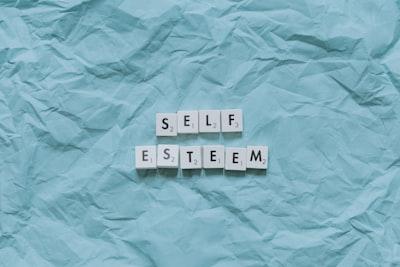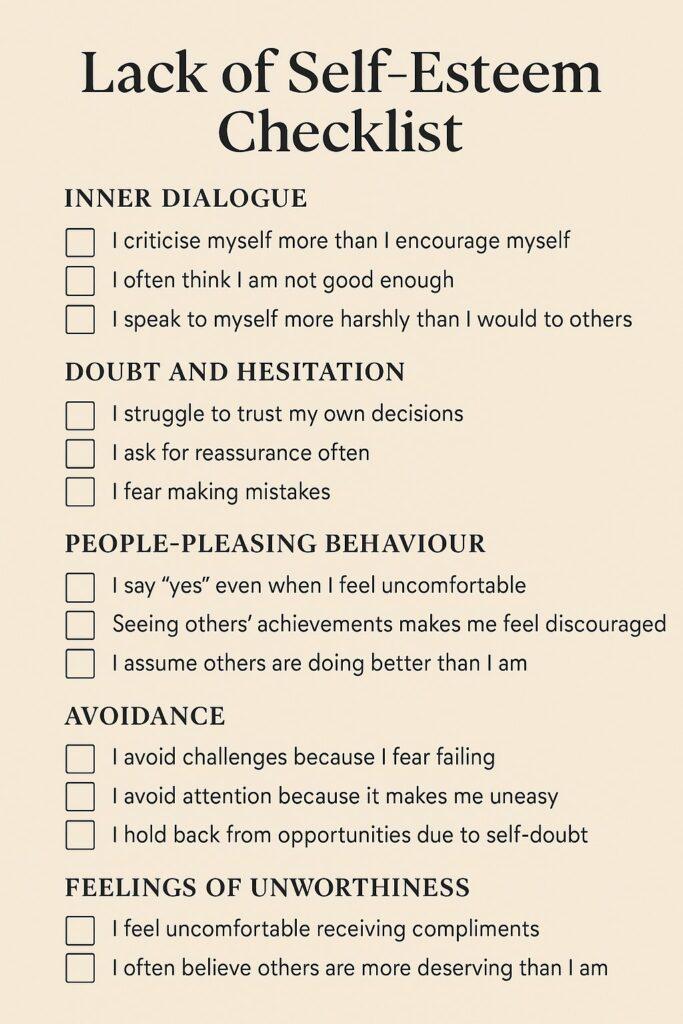Understanding Self-Esteem: Meaning, Examples, Types, and How to Raise It

Self-esteem plays a central role in your self-worth, how you move through daily life, and how you deal with challenges. Understanding self-esteem will give you ways to rebuild your self-confidence after setbacks.
Whether you are trying to improve your negative self-talk or writing about personal growth, knowing the foundations of self-esteem helps you create more self-acceptance.
This post explains the meaning, types, examples, and practical ways to raise your self-esteem. We also provide some self-esteem quotes for inspiration.
What Does Self-Esteem Mean?
Self-esteem refers to the opinion you hold about yourself. It is the internal picture you carry about your abilities, appearance, value, and potential. When your self-esteem is healthy, you believe you are worthy of respect, capable of meeting your goals, and free to have your own voice. When your self-esteem is low, you tend to doubt yourself, overthink mistakes, and assume you are falling short even when you are giving your best.
Self-esteem takes form during your childhood, but it continues to shift throughout life. Experiences such as relationships, failure, success, health changes, or work stress can change how you see yourself and is not fixed. You can strengthen self-esteem through daily choices, new habits, and supportive environments.
A key point is that self-esteem is not the same as arrogance or a sense of superiority. It is not about placing yourself above others. Healthy self-esteem simply means having a balanced view of who you are, with an understanding of both strengths and areas you are still working on. It is self-compassion that helps you face life without constant self-doubt.

What are Three Types of Self-Esteem?
Many psychologists explain self-esteem in different ways, but a common breakdown includes three types: high self-esteem, low self-esteem, and unstable self-esteem.
1. High Self-Esteem
People with high self-esteem feel secure in who they are. They make decisions without constant fear of judgement. They see mistakes as part of learning, not as proof that something is wrong with them. This does not mean they never struggle. Rather, they have enough internal stability to keep going even when life becomes challenging.
2. Low Self-Esteem
Low self-esteem creates a sense of doubt, insecurity, and comparison. A person may assume they are not as capable as others, even when this is not true. You may feel uncomfortable asserting yourself, setting boundaries, or trying new things. Low self-esteem can grow from experiences such as criticism, neglect, bullying, or long-term stress.
3. Unstable Self-Esteem
Unstable self-esteem rises and falls quickly. You may feel confident one moment and discouraged the next, depending on external events. Praise gives you a boost, but criticism hits them hard. Because your inner sense of worth is not steady, you rely on outside approval to feel safe. Even small disappointments can leave you feeling overwhelmed.
Understanding these three types helps you observe where you stand and where you want to go. The goal is not perfection. The aim should be a calm, grounded sense of self that does not collapse under pressure.
Understanding Self-Esteem: Some Examples
A simple example of self-esteem is this:
You prepare a presentation at work. You do your research, practise your talking points, and deliver it to your team. Afterward, you feel proud that you managed the pressure well. Even if you stumbled on a few sentences, you remind yourself that doing something challenging is an achievement. This sense of satisfaction and acceptance reflects someone with healthy self-esteem.
Another example is how you speak to yourself after a mistake. A person with low self-esteem might say, “I always mess things up.” Someone with healthier self-esteem might say, “I made a mistake, but I can fix it.” That small shift in your inner dialogue shows a very different way of relating to yourself.
These examples show that self-esteem is not about perfection but about how you see your worth in the middle of ordinary life.
How Do I Raise My Self-Esteem?
If you have been asking How do I raise my self-esteem? you are not alone. Many people want to feel more confident but do not know where to begin. Raising self-esteem is a process that requires patience, but you can make real progress with steady habits.
1. Change Your Inner Dialogue
Your inner voice influences how you feel about yourself. If you speak to yourself harshly, you weaken your sense of worth. Start noticing your words. Replace thoughts like “I’m useless” with “I’m learning,” or “I can try again.” Kindness to yourself is a powerful step toward stronger self-esteem.
2. Set Small, Achievable Goals
Large goals can feel overwhelming. Instead, choose one small task you can complete each day. These small wins help rebuild confidence. Over time, they show you that you are capable of progress, even when life feels difficult.
3. Spend Time With Supportive People
People who build you up make a major difference. Spend time with those who encourage you and listen without judgement. Distance yourself from those who constantly criticise, dismiss, or belittle you. Supportive relationships help your self-esteem grow.
4. Limit Comparison
Comparing yourself to others, especially on social media, weakens your sense of worth. Remember that people only share selected moments of their lives online. Focus on your own path, your own progress, and your own strengths.
5. Learn To Say “No”
When your self-esteem is low, you might agree to things you do not want to do because you fear conflict or rejection. Practising clear boundaries helps you feel safer, more confident, and more in control of your time and energy. Learn to say no.
6. Acknowledge What You are Doing Well
Each person has strengths. Some are skilled at listening, others at problem-solving, creativity, or caring for loved ones. Take a few minutes each day to note one thing you did well. These small acknowledgements reinforce your sense of competence.
7. Seek Professional Help if Needed
A counsellor or psychologist can offer guidance if your self-esteem is impacted by trauma, long-term stress, or anxiety. Rebuilding self-esteem is a skill, and support can make the process easier.
8. Be Your Authentic Self
When you learn how to be your authentic self, you start accepting who you are and no longer compare yourself to others. Instead you live a life of self-love and self-compassion.
Self-Esteem Quotes for Daily Encouragement
If you want quick inspiration, here are a few self-esteem quotes you can save or read when you need a lift:
I am enough, exactly as I am.
I choose to value myself instead of seeking approval.
I speak to myself with kindness and respect.
I know my worth, even when others do not see it.
I am proud of how far I have come.
I deserve love, peace, and confidence.
I trust myself to handle whatever comes my way.
I honour my needs and set boundaries that protect my well-being.
I am learning, growing, and becoming stronger every day.
I believe in myself and the life I am building.

Understanding self-esteem takes time but you can start by being kind to yourself to boost your self-esteem which is an important part of your emotional well-being. If you have wondered how to raise your self-esteem, remember that meaningful change starts with self-compassion, more self-love, small steps, and a supportive environment.
With time, your confidence will become steadier, your inner voice softens, and you begin to trust yourself again. The journey is not always smooth, but it is possible, and every step you take brings you closer to a healthier sense of self and higher self-esteem.
Do you ever feel overlooked, undervalued, or misunderstood because you are quiet?
In a world that rewards loud voices and constant visibility, many quiet people struggle with self-esteem. Your thoughtful nature may be mistaken for shyness, your preference for calm as weakness. Over time, these misunderstandings can affect your confidence and make you question your worth.
The Quiet Self Esteem Method offers a different path. This practical guide is designed for people who want to build lasting confidence without pretending to be someone they are not. Through small, daily habits, you will learn how to strengthen your sense of self-worth, protect your energy, and create boundaries that honour your needs.
Inside, you will discover why quiet people often struggle with self-esteem and how to turn your quiet personality into a strength. You will also learn simple techniques to silence your inner critic and stop comparing yourself to others. If you want to know how to set boundaries without guilt and find ways to speak up, be heard, and connect meaningfully with others, this book is for you.
However, this book is not about becoming louder or forcing yourself into the spotlight. It is about learning to value who you are, showing up with quiet confidence, and living with self-respect.
If you have ever felt that your voice was too soft for the world to notice, this book will remind you that quiet does not mean invisible. Confidence can be calm, steady, and powerful.
Take the first step towards unshakable self-esteem today.
Continue Reading
- How to Deal with Unexpected Situations: When Life Throws You a Curveball
- How Mindset Quotes Can Change the Way You Think
- Stop Absorbing Others’ Feelings And Acting As An Emotional Sponge
- Use The Third Chair Technique To Gain Clarity
- Forgive Yourself: A Guide to Healing and Inner Peace
Leave a Comment